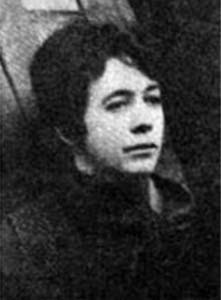María de los Angeles Cano Márquez

María de los Ángeles Cano Márquez, known as the La Flor del Trabajo (the Flower of Work), was born in Medellín in 1887. She grew up exposed to very liberal, if not radical, thoughts from her childhood.
María Cano was greatly influenced by the feminist authors of her day (Agustini, Storni, Ibarbourou & Mistral). In 1923, she helped write El Correo Liberal (The Liberal Mail). Then, together with María Eastman and Fita Uribe, she tried to start a Colombian feminist literary movement. She, herself, helped to found the Cyrano magazine in 1921 -- her effort to bring access to literature to the masses, and particularly to lower class workers. Most of the magazine's authors were political dissidents, sympathetic to the Russian Revolution.In 1924, her efforts to bring literature to the people included establishing a Public Library -- known as the Biblioteca Municipal. At the library, she offered to teach the illiterate to read.
The more common people she met, the more interested she became in worker's rights. She became aware of a group of Oil workers that had been transferred from Barrancabermeja to a jail in Medellín. At news of this, she formed her first public protest, demanding justice for social prisoners. Then, she went on to work tirelessly to eliminate the country's Death Penalty.
In 1926, she helped organize the third National Workers Conference, and at the conference she was instrumental in the founding of the Partido Socialista Revolucionario or PSR (Socialist Revolutionary Party). Her efforts at the conference were then followed by a tour of Colombia -- where her speeches drew large crowds and many supporters. However, in many places, she was also met by those opposed to her efforts. She was detained, followed, and threatened.
In November of 1928, she participated in the Banana Strikes against the United Fruit Company. (For those of you that have read 100 Years of Solitude, you'll remember García-Márquez's description of these events). These strikes ended in the massacre of hundreds (if not thousands) of Colombian banana farm workers in Ciénaga, Magdalena, on December 6, 1828. Though María was no longer in the area at the time of the massacre, she was arrested in Medellín for her participation in the strikes which lead to the massacre. These events, together with the economic down turn of 1930, lead to the abolishment of the PSR.
After this, María became a public worker in Medellín, where she worked peacefully until 1947. During that time, she did support a Rail Worker strike in 1934 and in 1945, she supported a failed Suffragist movement.
She died in 1967, and is considered a heroine of Colombian workers today. In Medellín, Avenida 33 carries the name María Cano.
Comments